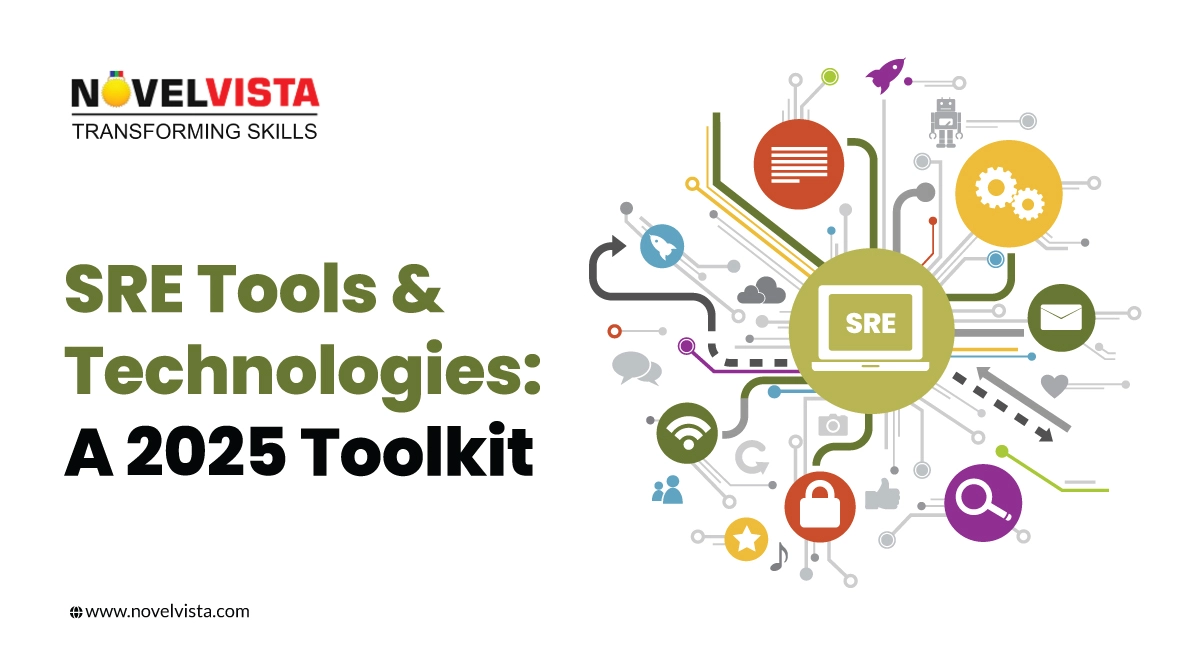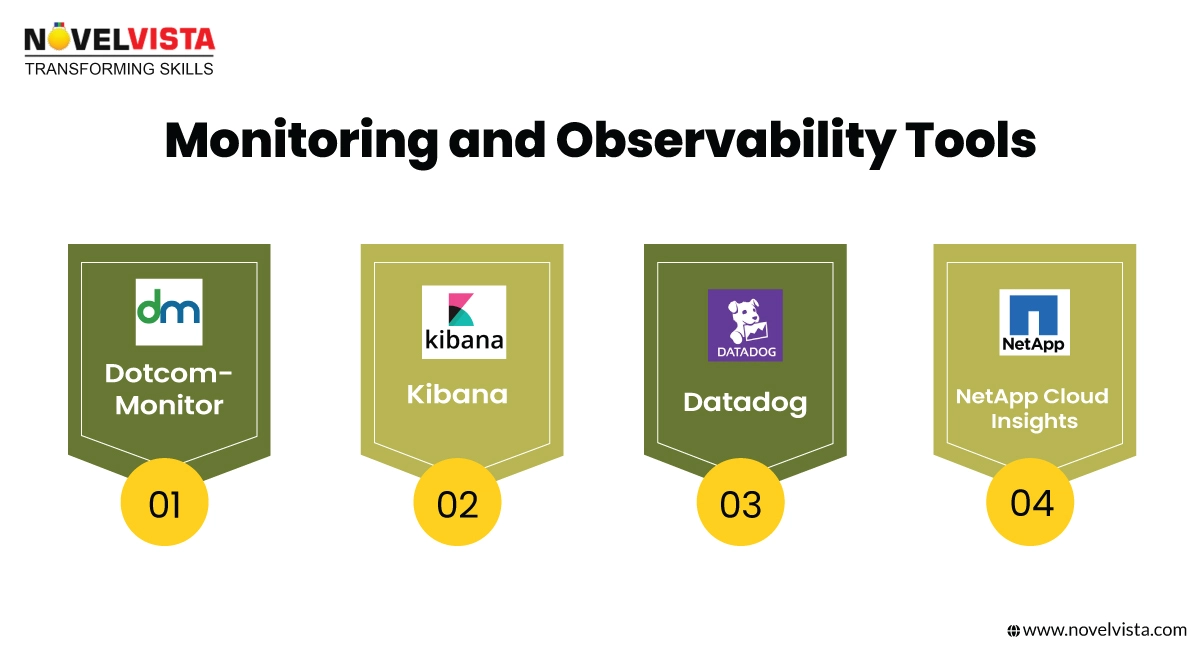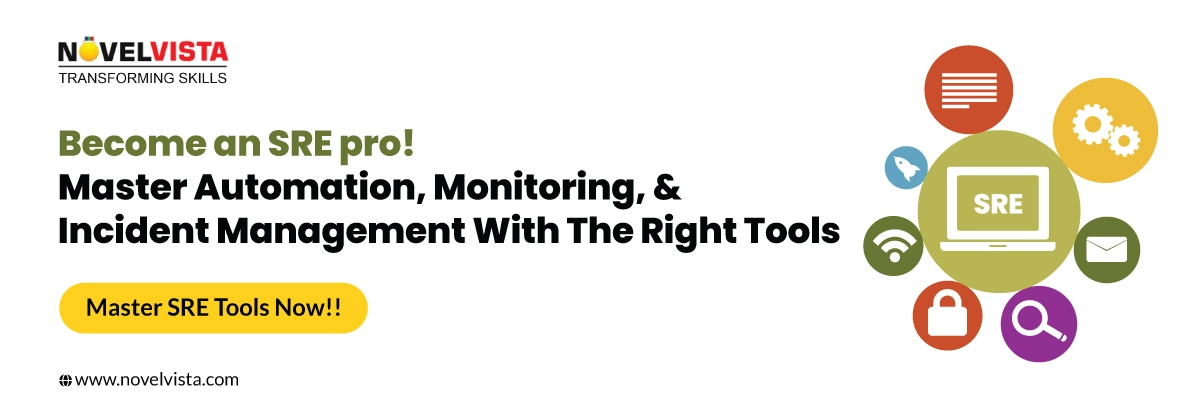Enroll Now and Get Upto 30% Off
* Your personal details are for internal use only and will remain confidential.

Last updated 25/03/2025

As we proceed with 2025, DevOps, Site Dependability Engineering, and technologies are evolving continuously with the latest updates and features. It also brings new tools that are designed to improve productivity, scalability, and consistency in software development and operations. Site Reliability Engineer certification helps you understand the latest tools and technologies you need to use.
The business scale can impact the duties and function of a site reliability engineer (SRE) and the tools available to them. Most site reliability engineers employ various technologies that reflect their constantly changing duties because they are typically focused on many jobs and projects at once.
There will be additional tools in that toolkit since a typical SRE is always automating, optimizing code, updating servers, and keeping an eye on performance dashboards, among other things. Through SRE certification you will understand core practices of site reliability engineers, and make sure to go through it.
Today, through this blog, we will discover the SRE tools and techniques for SRE that can be effectively used to drive the reliability and stability of software systems.
Site reliability engineering, also known as SRE, is a software engineering method for managing IT operations. SRE teams use software to automate operational duties, control systems, and address problems.
Traditionally, operations teams have completed these activities manually. SRE transfers these responsibilities to engineers or operations teams, who utilize software and automation to manage production systems and fix problems.
SRE is a valuable technique when developing scalable and highly dependable software systems. Using code to manage extensive systems makes it easier for system administrators, or sysadmins, to scale and maintain thousands or even hundreds of thousands of machines.
A method of software engineering called Site Dependability Engineering aims to maximize application service availability, latency, speed, scalability, security, and dependability. To accomplish these tasks, SREs employ various technologies, including automation tools, performance analytics and reporting tools, configuration management and versioning tools, on-call management tools, incident management tools, and log aggregation and monitoring tools.
Site reliability engineering techniques benefit enterprises by guaranteeing their products' most robust and reliable delivery. Maintaining SRE best practices may be accomplished using a set of clearly defined tools implemented at each stage of the production system.
SREs need to standardize the tool stacks to support the fast-evolving teams of software engineers in a scalable and efficient manner. Following are the different toolkits that SREs can leverage to perform their operations and tasks effectively.
Let’s face it—keeping a system running smoothly isn’t just about fixing things when they break; it’s about stopping issues before they happen! That’s where SRE monitoring tools come into play. Here are some essential tools used by SRE teams:

Think of this as your website’s health tracker. It monitors real users and simulates visits to ensure your site performs at its best.
Data is useless if you can’t see it. Kibana helps you visualise logs and metrics so you can make intelligent decisions
The ultimate APM tool (Application Performance Monitoring) gives you a 360-degree view of your application’s health, from infrastructure to code performance.
Spot infrastructure slowdowns before they cause trouble and optimise cloud resources on the go.
Want to master SRE best practices and get hands-on with these tools? Check out SRE Practitioner Training and Certification!

Applications become more portable due to this adaptability, as they may operate anywhere without concern about external circumstances. Furthermore, containerization technology facilitates continuous integration and delivery (CI/CD), enabling developers to change code continually and launch applications more quickly and effectively.
While this might seem remarkably familiar to Docker, Kubernetes is not the direct competitor to Docker as Kubernetes can be used in addition to the Docker Platform. However, Docker has an orchestration solution called Docker Swarm. Kubernetes manages many containers simultaneously, helping to evolve applications without interrupting service to users and monitoring the overall health of applications.
Prometheus gathers metrics about your applications and infrastructure, monitors them, and produces data through dashboards and visualizations.
The most crucial metrics may be set into dashboard panels. Grafana supports many data sources, including Prometheus, MySQL, Elasticsearch, SQL, AWS, and others.
It provides real-time visibility into the user journey, infrastructure, and application code. With the capabilities and potential of Machine Learning, this tool can predict and prevent performance problems.
We know that there are different platforms that provide certifications but Novelvista’ SRE certifications will equip you with in-depth knowledge and real time practices. It not only helps you in your work but fortifies you with trends in SRE.

If you’re an SRE, you love automation. Why spend time doing manual work when you can make your system work for you? Here are some game-changer tools:
One of the go-to SRE CI/CD tools for automating software deployment and ensuring a smooth pipeline.
Need centralised logging to track issues? ELK Stack has got your back!
What is Terraform? It is nothing but the magic wand of infrastructure automation, helping you provision and scale resources effortlessly.
What is Ansible? Think of Ansible as your personal IT assistant, automating system configurations and deployments in just a few clicks.
Using the right SRE tools means you’re automating the boring stuff so you can focus on making things faster, more reliable, and more efficient!
Imagine your system is crashing, and you must alert the right team—FAST! That’s where these real-time communication tools shine:
Instant messaging + integrations = quick alerts and fast decision-making.
Secure and lightning-fast, great for incident management on the go.
Do you need a complete collaboration suite? Teams offer chats, video calls, and file sharing.
But wait, how do you handle serious incidents without chaos? That’s where PagerDuty incident response steps in! It automates alerts, escalations, and incident tracking—so you can fix problems before users notice.
Mastering SRE tools isn’t just about learning tech—it’s about making life easier for your team. Whether you’re monitoring systems, automating deployments, or responding to incidents, the right tools make all the difference.
Want to take your SRE skills to the next level? Novelvista has you covered with expert-led SRE training. Get started with SRE Practitioner Training and Certification today!
Let’s build more reliable systems, one tool at a time!

As we enter 2025, these SRE technologies and tools guide you through the complexities of modern Information Technology operations. From real-time observability to predictive analytics, the SRE toolkit 2025 is a testament to the continued evolution of technologies, providing that systems remain dependable, scalable, and ahead of the curve in an ever-changing digital landscape.
The SRE certification cost is also affordable to you so it would be beneficial for you to go for it. Through the certification you will explore the SRE toolkit which is selected based on various factors, including the size of your application, the technology stack, and your specific monitoring needs. Evaluate each tool based on your requirements, considering factors such as real-time monitoring, analytics capabilities, and ease of integration.
As applications evolve, investing in a robust strategy becomes crucial for delivering optimal user experiences. Explore the site reliability engineering certification to designate yourself with the insights needed to drive application performance excellence. Topic Related PostNovelVista Learning Solutions is a professionally managed training organization with specialization in certification courses. The core management team consists of highly qualified professionals with vast industry experience. NovelVista is an Accredited Training Organization (ATO) to conduct all levels of ITIL Courses. We also conduct training on DevOps, AWS Solution Architect associate, Prince2, MSP, CSM, Cloud Computing, Apache Hadoop, Six Sigma, ISO 20000/27000 & Agile Methodologies.
* Your personal details are for internal use only and will remain confidential.